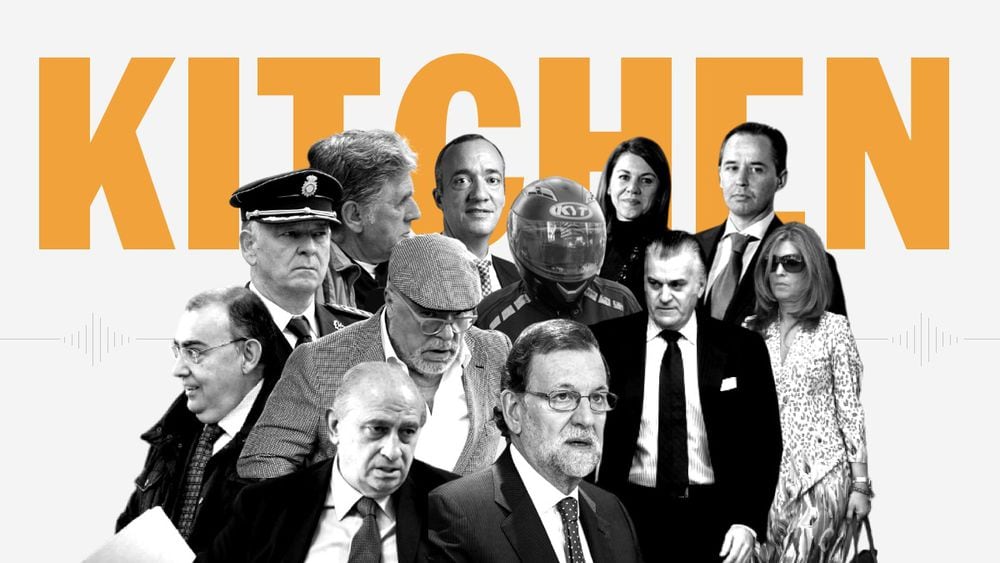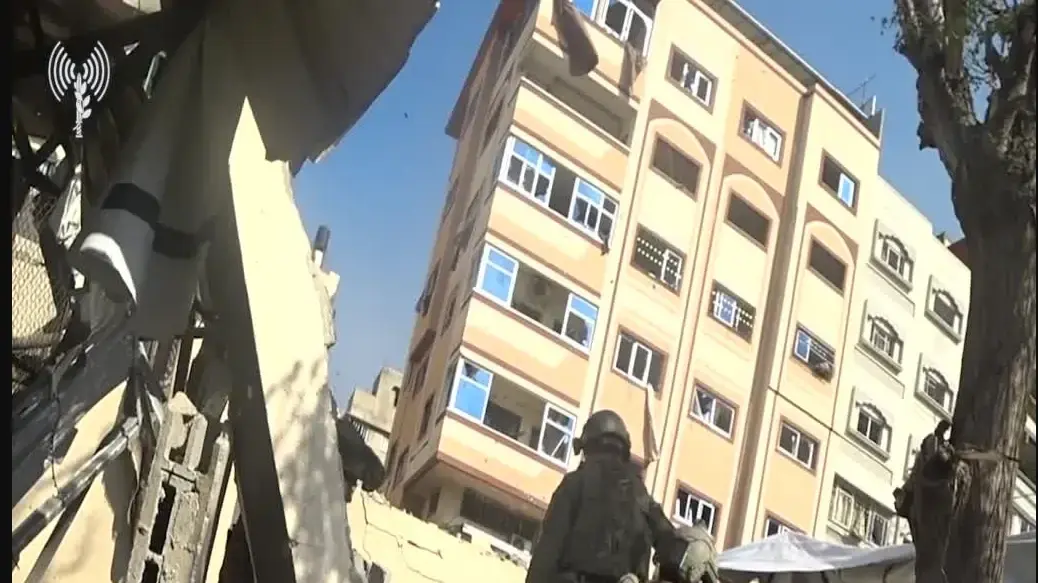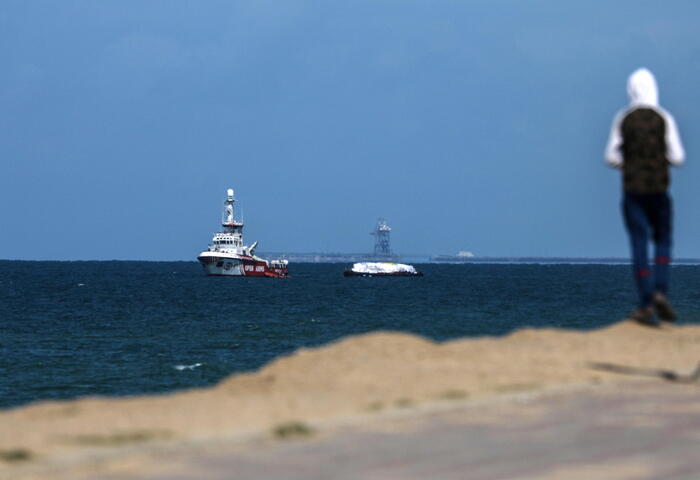The history of the PP was stained forever on July 15, 2013. That day, Luis Bárcenas, manager and treasurer of the conservative formation for almost 20 years, handed over some dirty laundry from his party to Pablo Ruz, head of the court of instruction number 5 of the National Court.
Bárcenas had been in jail for a month for his dealings with the Gürtel plot, the corrupt network run by Francisco Correa, and he decided to tell the judge some things he knew firsthand.
He felt that the party he had served so long had left him.
He arrived with a folder where he kept the documentation to prove the crimes he was going to confess.
For almost five hours, Bárcenas detailed the illegal financing of the conservative formation between 1990 and 2009. Loquacious and collaborative, the former treasurer identified those who donated large amounts to the party —eight million euros between 1990 and 2009 — and those who benefited from it. booty.
He cited dates from memory and gave figures of that hidden and illegal system in which dozens of businessmen participated, most of them contractors of the administration, and from which the main leaders of the PP supposedly benefited.
His account of widespread corruption in the party then ruling Spain ended with a bitter confidence.
To questions from his lawyer, Bárcenas related that the PP had offered him 500,000 euros for his silence ... and for the freedom of his wife, Rosalía Iglesias.
Two days before the ex-treasurer of the PP went to the National Court for that historic confession, an operation paid for with funds reserved to search for the secrets of Bárcenas was already underway at the Ministry of the Interior, named after the commissioner José Manuel Villarejo. :
Operation Kitchen
.
A plot that, after remaining hidden for five years, exploded on October 29, 2018 with a report from the Internal Affairs Unit sent to Manuel García-Castellón, the judge in the
Villarejo case
.
Two years later, the investigations continue, already turned into a crossfire battle between the former commanders of the Police and the Interior.
The thousands of pages of the summary contain numerous evidence that supports the existence of the device without judicial control.
The commissioners who participated admit this and point to the political leadership of the Ministry as knowledgeable and responsible for it.
But former minister Jorge Fernández Díaz left them alone this Friday by saying that he only heard about Kitchen from the press.
Francisco Martínez, former secretary of state and his former
right-hand man
, did not go that far.
But, after going to a notary to record some messages from the minister that would guarantee that he was aware and tell the judge that he learned about the plot from his former boss, he also added that he believed it was legal.
Chapter 1
The
origin
Mariano Rajoy lowers his eyes and fixes his gaze on the seven pages that are stacked on a white lectern headed by the initials of the PP.
It is February 2, 2013, the first time that the President of the Government dares to offer in public, with a serious gesture, a dark suit and striped tie, a kind of explanation about Luis Bárcenas' papers, published by EL PAÍS for two days before.
He does it shielded behind a plasma and without the possibility of journalists asking.
"Dear friends of the National Executive Committee of the Popular Party ...", it starts.
He denies the existence of a box by defending the "honesty" and "integrity" of his party for 15 minutes and 8 seconds.
Without mentioning at any time the name of its former treasurer.
"Everything is false", they repeat in the formation while they reduce the veracity of the scandal that surrounds the Executive.
But five kilometers from La Moncloa, in the Ministry of the Interior, the threat posed by Bárcenas and his manuscripts is taken very seriously.
Five months later, on Saturday, July 13, 2013, the Government is still barely resisting the political pressure due to the allegedly criminal events that Bárcenas' papers point to.
But in Moncloa, concern grows in the face of an imminent judicial declaration that could ruin the future of an Executive that enjoys an absolute majority capable of withstanding any crisis.
The former treasurer, who has been in prison for more than a month in Soto del Real, has promised to pull the blanket and on Monday 15 he has an appointment with Judge Pablo Ruz at the National Court.
One way to neutralize it is to know what documents it hides and get hold of them so that they do not reach the judge's hands.
According to the instructor and the Anti-Corruption prosecutors in the
Kitchen case
, Francisco Martínez, a lawyer in the Courts and an expert in law, who has been appointed Secretary of State for Security, would dedicate himself to that task.
Its boss is Minister Jorge Fernández Díaz.
Both speak on Saturday, July 13, on the eve of Bárcenas' statement before the judge.
"I learned it from the minister," Martínez explained to EL PAÍS.
A version that he similarly repeated to the judge last Thursday.
“He called me, I don't remember if it was a Saturday or a Sunday afternoon, to tell me that an informant was going to collaborate with the police to see what happened to Bárcenas.
Then he sent me a message on WhatsApp reminding me of the matter.
He was in the habit of sending me the things we had discussed in writing, so that it would be recorded or not forgotten.
I was stunned.
I spoke with the Deputy Director of Police Operations, Eugenio Pino, and he told me that yes, there was a group of police officers with the confidant, that he was Bárcenas's driver, and that El Gordo [Commissioner Enrique García Castaño ] and Villarejo.
In addition, he made it clear to me that nothing was in writing ”.
The
arrives at 20.29 that day.
"Driver B: Sergio Javier Rios Esgueva (now he performs that function with his wife)".
At 22.20, he receives another: "It's important."
"Driver B: Sergio Javier Rios Esgueva (now he performs that role with his wife)"
Message from Fernández Díaz to Francisco Martínez (13-7-2013. 20.29)
The Interior Ministry, according to the investigation, mobilizes several veteran and powerful commissioners for a secret operation carried out behind the judge's back.
The highest police chief, commissioner Eugenio Pino, entrusts the work to the also commissioner Enrique García Castaño, chief commissioner of the Central Unit of Operational Support (UCAO), a policeman who for 20 years has dedicated himself to tapping telephones, microphones in places implausible or following suspects and criminals.
"It is transmitted to me from the Ministry of the Interior that it was actually to discover if Bárcenas had taken some hard drives from the headquarters of the PP in which the financing that the PP had received from donations, payments ...", García Castaño acknowledged before the judge almost six years after the events, after the judicial investigation has already uncovered the parapolice operation to spy on the former treasurer and his family with the alleged objective of snatching compromising papers for high party positions before he fell into hands of justice.
They feared that the one who had managed the accounts for years, already in prison on a preventive basis, would keep more bullets in the chamber.
García Castaño tells it to the judge Manuel García-Castellón.
“The [Secretary of State for Security, Francisco Martínez] told me in his office that the concern is that Bárcenas has taken, I don't know how he did it, some hard drives.
And that all the accounting is on those hard drives.
The donations that were given, it is not known how many he received and how many stayed ... ”.
The
number two
of the Ministry of the Interior coordinates the entire operation and receives information in real time of the results, continues El Gordo when it is impossible to hide the operation.
Internal Affairs has found the records of follow-up on Bárcenas' family.
There are hundreds of pages with the movements of the wife and the son of the former treasurer between July 25 and October 11, 2013. That documentation never reached Judge Ruz, who instructed the case in the National Court and who had sent to the Bárcenas jailed, nor the UDEF police officers who were investigating the events.
Commissioner José Manuel Villarejo, who also participated in the plot, pointed in the same direction: he had to "find out if there was a place" where the former treasurer hid the documentation and "if it was or was not of police or judicial interest."
In fact, he was in charge of convincing Bárcenas' driver to collaborate, promising him a monthly salary out of the reserved funds and obtaining information from him on the steps that the former treasurer's family is taking.
The head of the entire alleged illegal plot is Eugenio Pino, Deputy Director of Police Operations.
When he goes before the judge to give explanations, he asserts that the secret operation was aimed at seeking money in Switzerland from three popular leaders: Bárcenas, Javier Arenas and Francisco Álvarez Cascos.
The investigators do not believe him and insist in their investigations that they were looking for compromising material from high officials of the PP to take it away from the former treasurer before the instructor Pablo Ruz took them.
Chapter 2
The
capture of the
confidant
Sergio Ríos signed up as Bárcenas' driver in February 2013. The former treasurer is going through his worst moment in the match: the investigation of the Gürtel case has uncovered his hidden accounts in Switzerland, where he has accumulated almost 50 million euros;
EL PAÍS has published the secret accounts that it kept in its own hand for years;
and the PP has dismissed him deferred.
Four months after that, with Bárcenas in prison, Ríos remains in the service of the wife of former treasurer Rosalía Iglesias.
And the police leadership of the Ministry of the Interior, according to the investigators, is looking for him as a collaborator of a special and secret mission: to save the PP Government from the secrets that Bárcenas hides.
The meeting takes place on an undetermined day in 2013. Ríos, a former military man eager to join the police force and who makes a living as a private bodyguard, meets with Villarejo.
"I'll call you chef," says the commissioner.
- And that name?
- Damn, what's your name Sergio, well, because of [the cook] Sergi Arola.
We are going to put you chef.
Operation Kitchen has just been christened, although that name will never appear in official police records.
After a failed attempt by García Castaño to capture the driver, the top police chief, Eugenio Pino, turns to Villarejo to convince the driver.
According to Pino told the judge, the initiative to follow the former treasurer through the driver came from Andrés Gómez Gordo, a police inspector hired by María Dolores de Cospedal as general director in Castilla-La Mancha.
"He said that they were meeting in Baqueira Beret, that there were a number of people there who could take the money and go to Switzerland," said Pino.
“Mr. Gómez Gordo said that the driver was in charge of going to Switzerland mainly for money.
And Gómez Gordo said that the driver was the one who brought and carried the money from the front men ”.
Ríos had been a leader of Francisco Granados, former secretary general of the PP in Madrid and Minister of Justice and Interior of the Government of Esperanza Aguirre.
While waiting for the institutional events, he met Gómez Gordo, according to this account.
This relationship made it easier for the driver to become the police confidante through Commissioner Villarejo, who asked him for information about the movements of Rosalía Iglesias and information about the places where the ex-treasurer of the PP could have hidden the documents that worried the Government of Mariano Rajoy.
"They use me because they say that I have a certain ability to convince people," Villarejo tells the judge.
Cap 3
The Police steal
the secrets
of Bárcenas
On October 18, 2013, the mobile phone of Francisco Martínez, Secretary of State for Security, records a message from Minister Jorge Fernández Díaz: “The operation was successful.
Everything has been overturned (2 iphone and 1 Ipad).
Tomorrow we will have the report.
According to the informant (we will see if this is the case) that material B had given to the lawyers in order to obtain from them the telephone numbers and other information in their agenda, in order to contact them to prepare their legal defense ... That is, that it would not be information for the J. for the purpose of its publication (...) Another thing that we with the dump carried out can access great and interesting information.
I inform you".
This message, whose authorship Fernández Díaz denies but to which the investigators grant all credibility, is incorporated into the case after Martínez attested to its existence in a notarial act when he felt abandoned by the PP after the scandal broke out.
In addition, it is used as proof of the existence of one of the three actions carried out by the police plot without judicial authorization to obtain documentation from Bárcenas.
The commissioner García Castaño was the executor of the irregular extraction of the content of those three devices, as well as the entry into two premises where it was suspected that the ex-treasurer could hide documentation, as he admitted to the judge.
Everything happens three months after Bárcenas' confession before the judge, when the family's driver gets the mobile phone that the former treasurer, imprisoned since June, left at his home and two other devices.
They then hand it over to El Gordo and together they go to a VIPS cafeteria in Madrid, where they download the content to a computer thanks to two policemen from García Castaño's unit, as they themselves confirmed to the investigators.
"I say [to Ríos], 'Tomorrow you will bring me the three telephones.'
I meet him on Velázquez Street and he brings them to me.
They don't have a card ... and I bring in a technician and we extract what was available from the phones ”.
Chapter 4
The assault
of the false
priest
A discreet police device patrols Bárcenas' home day and night when, on October 23, 2013, a new character enters the scene.
Only five days after Operation Kitchen had obtained its first loot - the data stored on Luis Bárcenas' mobile devices - a 64-year-old man with petty crimes behind him enters the former treasurer's house disguised as a priest.
He says he is coming to resolve some prison matters for Luis Bárcenas.
Rosalía Iglesias believes him and they chat for 20 minutes.
The false priest convinces her to gather her son and the maid in a room, at which point she takes out an old revolver from a briefcase, ties the three of them with ties and demands that they hand over the
pendrives
containing the information. that will bring down the Government of Mariano Rajoy, as they are asked.
Judge García-Castellón suspects that this episode is related to the plot, although he has not yet been able to prove the connection.
The false priest currently suffers from mental problems and a cognitive impairment that prevents him from declaring.
He is in prison after being sentenced to 22 years for that kidnapping that ended when Bárcenas' son managed to untie himself and reduce him.
Commissioners Enrique García Castaño and José Manuel Villarejo marked distances and told the judge that the assault on Bárcenas' home is the work of a "nut" typical of a "Alfredo Landa film."
Chapter 5
The End
of Espionage
Judge Pablo Ruz received Bárcenas' computers in August 2013 from the PP.
In them there was no longer a trace of what the former treasurer had stored.
The Kitchen police operation began in June 2013 to search for Bárcenas' secrets, but it produced little results.
If the former treasurer kept more definitive evidence of illegal practices in the PP, the police did not find them.
Almost everything they discovered, on the mobile phones or in the papers stolen from the family, was already in the possession of the judge investigating the case or had been published in the media.
“The investigation was ended,” Commissioner Pino told the judge, “because fundamentally nothing was found.
Because a positive result had not been obtained ”.
The magistrate Pablo Ruz, the first instructor in the case regarding Bárcenas' papers, did not know about the police operation nor was he able to access the material stolen from the former treasurer by the agents in charge of Operation Kitchen.
Only four years later, when the Internal Affairs policemen entered the home of Commissioner José Manuel Villarejo, the first evidence was found of a deployment without judicial control - audits and received payments from reserved funds - carried out by the Ministry of the Interior.
Although some information about the espionage of Bárcenas had already been published two years earlier, no judicial investigation had so far identified the Interior and Police leadership.
Credits
Coordination and format: Guiomar del Ser and Alberto Quero
Art and design direction: Fernando Hernández
Design: Ana Fernández
Layout: Nelly Natalí
Video
Script: José Juan Morales.
Edition: Susana Sánchez Herradón




/cloudfront-eu-central-1.images.arcpublishing.com/prisa/W3IPUQJVVJGIRIK7S64EZBRHH4.jpg)




